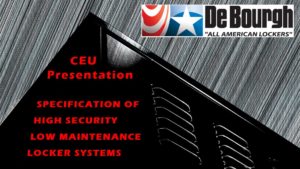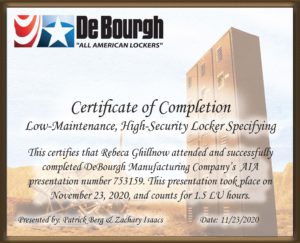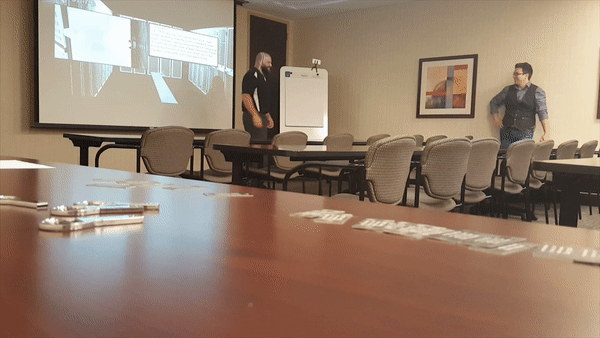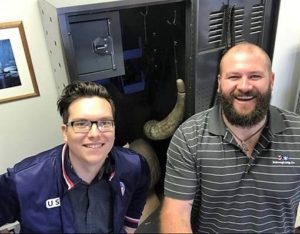To share some of the secrets of locker making, the DeBourgh team often travels around the country presenting on the intricate process of locker construction and why it matters in the design process. This information can be especially valuable for an architect.
American Institute of Architects is a membership group that provides architects with contacts and networking opportunities with representatives in nearby industries, as well as access to organized events. As part of the membership agreement, architects commit to earning continuing education units (CEUs), which are required when renewing an architect’s license.
AIA facilitates these learning requirements by approving manufacturers or product vendor’s presentations, allowing the experts to give architects in attendance an overview of a product and processes associated with the product.
“Lunch and Learns”
AIAs are typically held  over a lunch hour, when architects are most likely to have available time, the visiting manufacturer will provide lunch for the group and then present their talk during the break. These AIAs are known as or “Lunch and Learns” and should open the discussion on whatever field of expertise they have come to present on. This in-person experience gives attendees the chance to meet and speak with an expert in that buisness–not to mention a free lunch.
over a lunch hour, when architects are most likely to have available time, the visiting manufacturer will provide lunch for the group and then present their talk during the break. These AIAs are known as or “Lunch and Learns” and should open the discussion on whatever field of expertise they have come to present on. This in-person experience gives attendees the chance to meet and speak with an expert in that buisness–not to mention a free lunch.
A locker AIA should open the discussion on not only a locker as a whole but also what you can do so that the product you offer is one of high quality. Approved presenters should discuss product specs, lists services that are provided and why they’re important, and unmask common manufacturer loopholes that may be lowering the structural integrity of your locker. Attending architects can expect the presenter to provide new information on the relevant aspects of their field while simultaneously earning credits toward their CEUs.
Outside of instructor-led face-to-face groups some manufacturers offer online presentations that may also prove valuable for an architect. Online presentations offer more flexibility to conduct the event based on what will work best in your schedule. As well as providing the ability to not tie up an entire office, instead invite only the most relevant people that will benefit the most by attending.
Earning CEUs
 The biggest reason for architects to attend Lunch and Learns is to earn their CEU credits. However, most attendees want the experience to teach them something new, as well.
The biggest reason for architects to attend Lunch and Learns is to earn their CEU credits. However, most attendees want the experience to teach them something new, as well.
That’s why it’s important for an agency like AIA to facilitate transparency, to prevent these events from becoming just another sales meeting. AIA must approve presentations, based on how they follow specific rules meant to keep the course on track.
At an AIA event, the presenting manufacturer will provide a sign-in sheet for those that attend the entirety of the course. They are then also responsible for processing the information and issuing credits for those who were there, and passing on that information to the American Institute of Architects.
Credits earned at presentations by manufacturers can also be used to self-report when applying for a license renewal, to prove that they are continuing their education to meet state requirements.
Going Beyond the Credits
Even if architects aren’t interested in earning the credits, there is value in the presentations for their day-to-day work, too. It’s an opportunity for architects to learn as much as possible from a manufacturer or an expert in that field. An architect designing a building, a school, for instance, has to have everything that will be going into the building specified, from how it will function to how it will appear. There’s no way anyone can be expected to be an expert on every fixture, regulation, or specification.
 (***Side Note: If there are any savant architects out there who are already fully versed specifications and complete details of all products related to your building design, please contact us. We may have a movie deal just for you!)
(***Side Note: If there are any savant architects out there who are already fully versed specifications and complete details of all products related to your building design, please contact us. We may have a movie deal just for you!)
Unfortunately, for most of us, it’s impossible to acquire such a deep understanding of so many broad topics. What these talks attempt to do is give architects reference points and a foundation of understanding that they can take away and apply while in the field.
As any manufacturer who leads an AIA that must represent an entire industry, it’s their responsibility to present truly objective information on the product that isn’t exclusive to only what they themselves or their vendors offer. Meaning the presentation must provide information based off an industry standard that can be useful no matter who the architect is working with.
Without informational sessions like this, architects are reliant on old in-house specifications that may have been pre-determined years ago or they’re reliant on services that store different specs. Services like MasterSpec or Spec Link, will aggregate data into documents from which the architect can pick and choose from. The downfall of these services is much of the information that is provided is not always updated as quickly as the market changes. So it then becomes a problem for architects, manufacturers, and customers, especially for instance if the product they’ve meticulously chosen no longer exists.
 When manufacturers and experts provide the architects with additional information on what these products are and what’s available, they can also place them within the context of what is possible. Miscommunication and misunderstandings can be alleviated by getting information from the source themselves.
When manufacturers and experts provide the architects with additional information on what these products are and what’s available, they can also place them within the context of what is possible. Miscommunication and misunderstandings can be alleviated by getting information from the source themselves.
Whereas before when architects had questions they would end up discussing questions with whoever happened to be answering the phone that day, AIAs connect them with product experts to provide a person with whom they can follow up later in case of questions.
When the architect gains a broader understanding, everyone benefits. Even when an architect has the best intentions for product specifications, quality can be undermined if others issue RFIs or making the architect question themselves. The knowledge gives the architect a firmer ground from which to advocate for what they need.
If you’re an architect interested in hearing a presentation from DeBourgh Lockers specifically, use our contact form to let us know! We would be more than happy to schedule a presentation, we will even bring lunch to you!